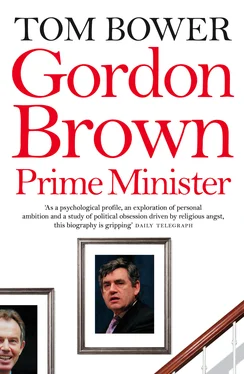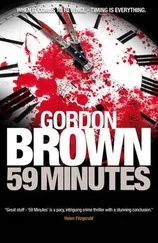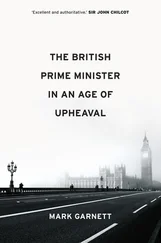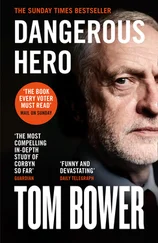1 ...6 7 8 10 11 12 ...32 In 1978 his impatience to become an MP was damaging his relationship with Margarita. Repeatedly, planned visits to the cinema and parties were abandoned as he responded to a telephone call and rushed to yet another meeting. In desperation, one night she had telephoned Owen Dudley Edwards with a ruse, asking, ‘Can you come down? Gordon wants you.’ Dudley Edwards arrived to discover that Brown was still drinking in a pub with two friends. Leaving Margarita alone had caused him no concern. The three friends eventually returned, slightly merry. Normally Brown’s companions would crash out on the floor while he flopped in an armchair to read a serious book. But on this occasion, while Margarita loudly reproached him, he picked her up and laughingly carried her to their bedroom. ‘You can see how in love they are,’ sang Dudley Edwards.
In an attempt to restore their faltering relationship, Margarita organised a weekend trip to a country cottage, and disconnected the telephone. Brown exploded in a rage. Relationships with women were sideshows in his life. He had become disturbed by the uneasy contrast of living with a sophisticated woman who enjoyed good food and elegant clothes, and the plight of Scottish workers, striking in large numbers across the country. While the party was immersed in strife as it tried to resolve the turmoil, Margarita seemed merely to tolerate Scottish provincialism, being principally concerned about the arrangements to visit her family in Geneva and her royal friends in their palatial homes across Europe. After five years, she also wanted evidence that the relationship had a future. Regardless of his affection, Brown was uncertain whether he could commit himself to a woman who was not a socialist, or could risk appearing with a princess before a constituency committee.
This crossroads in his personal life coincided with a remarkable political opportunity. Alexander Wilson, the Labour MP for Hamilton, a town south of Glasgow, died, and the constituency was looking for a candidate for the by-election on 31 May 1978. Hamilton had many attractions for Brown. The seat was a Labour stronghold, several senior party members had offered him their support, and his parents had moved to a church in the town. The obstacles were the other aspiring candidates. Alf Young, a journalist, was among them, although his chance of success was nil. Brown telephoned Young and asked whether he would stand aside. Young politely refused, adding that George Robertson, the Scottish party’s former chairman, who was supported by a major trade union, appeared certain of success. Brown aggressively challenged Young’s obstinacy, but failed to persuade him to surrender. A decisive voice, Brown knew, would be Jimmy Allison’s, the party’s organiser and a mini-Godfather. ‘It’s tight,’ said Allison, who knew the area well, ‘but you can win if you fight.’ Crucially, Allison pledged his support if Brown mounted a challenge. There might be blood, warned Allison, but that was acceptable among brothers. Even George Robertson, the favourite, acknowledged that there would be ‘a big fight’ if Brown stood, and the outcome would be uncertain.
‘I don’t know,’ Brown told Allison a few days later. ‘I think I should be loyal to the people in Edinburgh South. I don’t want to be seen as a carpetbagger and offend the good people who have helped me.’ Allison dismissed that as an irrelevance. Brown grunted and agreed to contact the party activists in Hamilton. But they, Allison heard, were unimpressed by his eagerness to avoid a fight with Robertson. Brown spoke about not being disloyal to the electors of Edinburgh South, but in truth he lacked the courage to work the system with a killer instinct. His caution was unexpected. Six years earlier he had confidently challenged Michael Swann. Outsiders were puzzled why the same determination now seemed to be lacking. They failed to understand Brown’s insecurity. He was still shocked by the consequences of his university protest for his academic career. His judgement, he believed, had been faulty. While he could confidently repudiate intellectual arguments, he lacked the resilience to withstand emotional pressure. He needed reassurance, but he had no one he could rely on. Some of his friends would dispute that he lacked courage. Others would say he feared failure. His consolation was hard work. Diligence, he believed, merited reward, and without hard work there should be no reward. That credo may be commendable for normal life, but not for ambitious politicians. Brown withdrew. Without a serious challenger, Robertson was nominated, and won the by-election by a margin of more than 6,000 votes. If Brown had arrived in Westminster in 1978, his own life, and possibly the Labour Party’s, would have been markedly different.
Similar indecisiveness plagued Brown’s relationship with Margarita. For weeks he hardly spent any time in Marchmont Road. James Callaghan had succeeded Harold Wilson as Labour prime minister, and increasingly Brown was preoccupied by the erosion of Callaghan’s authority – the government’s dependence on other parties at Westminster for a parliamentary majority had become unreliable – and the slide towards industrial chaos. In Scotland the party’s problems were compounded by disagreement about devolution. A referendum was to be held in March 1979, and the party was divided.
Excluded from those preoccupations, Margarita decided to end the relationship and leave Marchmont Road. ‘ I never stoppedloving him,’ she said in 1992, ‘but one day it didn’t seem right any more. It was politics, politics, politics, and I needed nurturing.’ Brown’s friends would say that he terminated the relationship. ‘She took it badly,’ they said, ‘that she was less important than meetings.’ But in truth Margarita simply was fed up, and walked out. A few weeks later she met Jim Keddie, a handsome fireman, with whom she started an affair that would last for six years. During the first months Brown telephoned her frequently to arrange meetings, but despite his entreaties that she return, she refused. Over a long session of drinks with Owen Dudley Edwards, Brown repeatedly said, ‘It’s the greatest mistake of my life. I should have married Margarita.’ If he had been elected to Westminster in 1974 or 1978 they might have married, but the uncertainty created irreconcilable pressures. Jim Keddie was convinced that Brown remained haunted by Margarita. Although Margarita never mentioned any regret about leaving Brown, for several months after her departure she would turn up without Keddie at parties in Marchmont Road, or would see Brown at dinner parties held by Wilf Stevenson, a man convinced of his own glorious destiny. Keddie sensed that she hoped the relationship might be rekindled, but there was no reunion. ‘It just hasn’t happened,’ Brown would say thereafter about love and marriage. In the space of a few months he had lost the chance of both an early arrival in Westminster and marriage to a woman he loved. Whether he was influenced by his research into James Maxton’s life, with all its failures and disappointments, to avoid similar distress himself is possible, but he had failed to overcome his caution and indecisiveness.
Beyond a tight circle of friends, Brown concealed his emotions and re-immersed himself in politics. For an aspiring realist, the prognosis could not have been worse. The trade unions were organising constant strikes, public services were disintegrating and inflation was soaring. The ‘winter of discontent’ began. Rubbish lay uncollected on the streets, the dead remained unburied and hospital porters refused to push the sick into operating theatres. The middle classes and many working-class Labour voters switched to the Conservatives to save them from what they felt had become a socialist hell. The opinion polls predicted Margaret Thatcher’s victory whenever James Callaghan dared to call the election. Brown’s prospects in Edinburgh South looked dismal, but once again he was offered an attractive alternative.
Читать дальше












